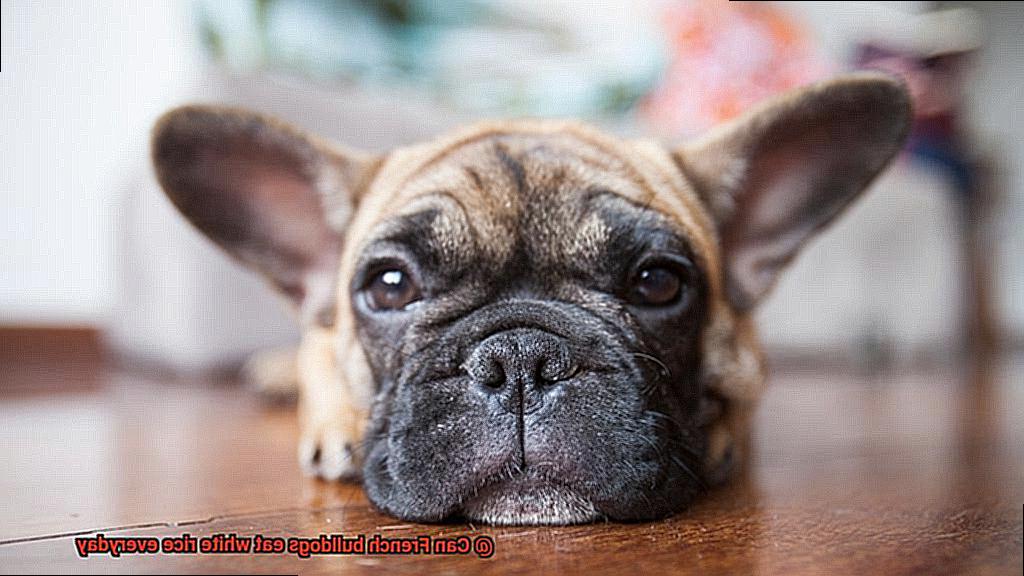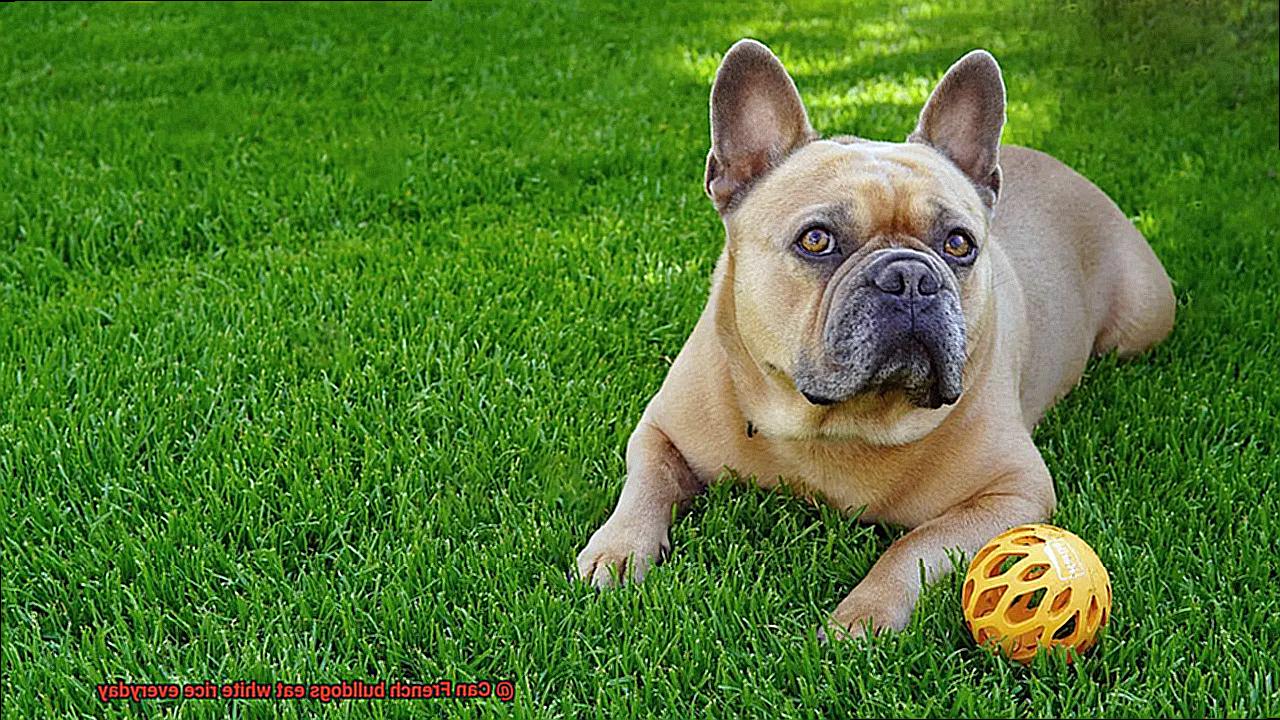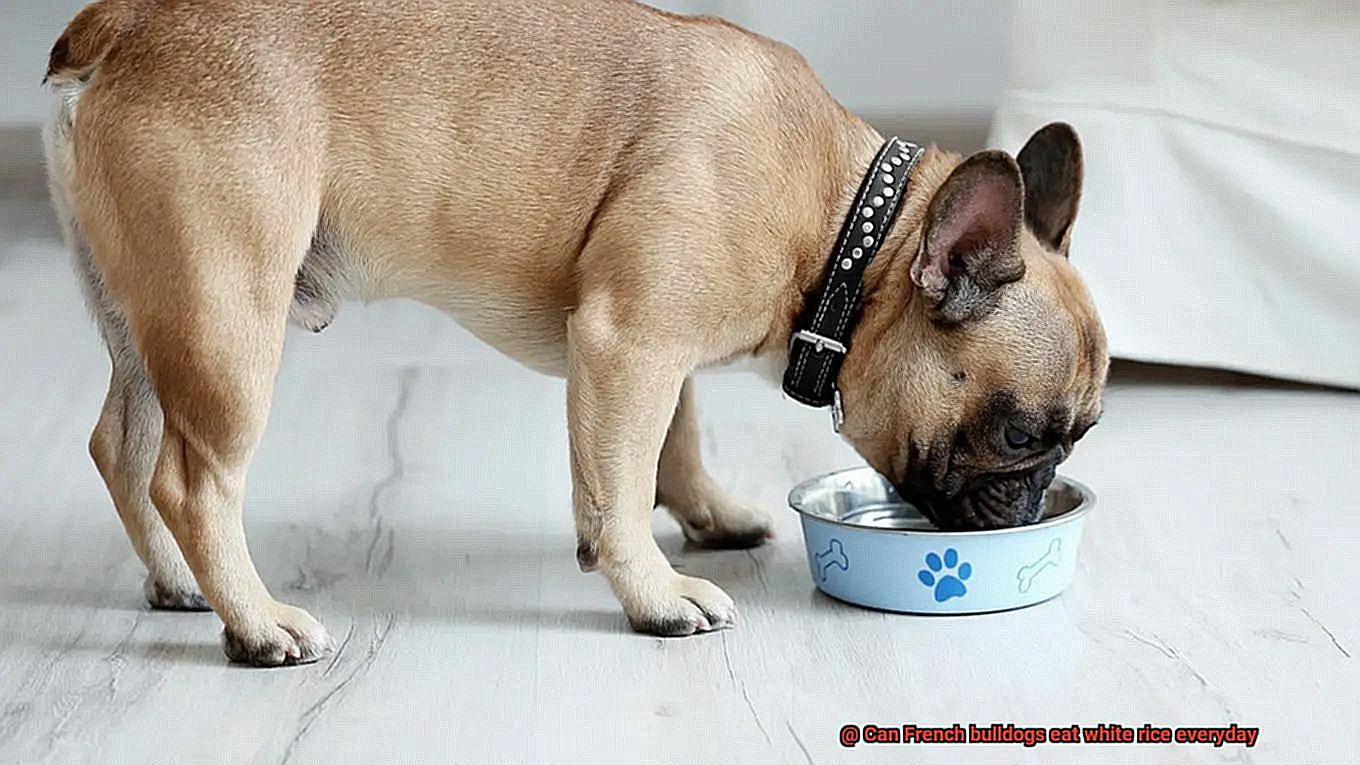Can French bulldogs eat white rice everyday?
French Bulldogs, those lovable bundles of joy with their distinctive bat-like ears and expressive eyes, hold a special place in our hearts. As devoted pet parents, we constantly strive to provide them with the best care possible, especially when it comes to their diet. And so, the question arises: can our Frenchies happily chow down on white rice every single day?
White rice, that humble grain found in kitchens around the world, has become a hot topic among Frenchie enthusiasts seeking to strike the perfect balance between nutrition and satisfaction. Is it safe to make this versatile carbohydrate a permanent fixture in our furry friend’s menu? In this blog post, we’ll embark on an enlightening journey together as we explore the pros and cons of incorporating white rice into your Frenchie’s everyday fare.
So grab a cup of coffee (or tea if you’re more refined), sit back, and let’s dive headfirst into the world of French Bulldogs and their relationship with white rice. We’ll consult experts in the field, uncover fascinating facts, and equip ourselves with the knowledge needed to make informed decisions about our beloved companions’ diets.
After all, ensuring their health and happiness is what being a responsible pet owner is all about.
What Nutrients Does White Rice Provide for French Bulldogs?
Contents
- 1 What Nutrients Does White Rice Provide for French Bulldogs?
- 2 What Are the Risks of Feeding French Bulldogs White Rice Every Day?
- 3 How Much White Rice Should French Bulldogs Eat Daily?
- 4 What Other Foods Can French Bulldogs Include in Their Diet?
- 5 Should You Consult a Professional Before Feeding Your French Bulldog White Rice?
- 6 Potential Allergies and Sensitivities to Grains in French Bulldogs
- 7 Tips for Monitoring Your Dog’s Reaction When Eating White Rice
- 8 Conclusion
Here, we will explore the many advantages of including white rice in your dog’s diet, as well as some important considerations to keep in mind.
Fueling Energy with Carbohydrates:
White rice is a fantastic source of carbohydrates, which are essential for providing energy to fuel your French Bulldog’s active lifestyle. Carbohydrates play a vital role in fueling their brain, muscles, and organs, ensuring they have the energy they need to thrive throughout the day.
Gentle on the Digestive System:
One of the significant advantages of white rice is its ease of digestion. This makes it an excellent option for French Bulldogs who may have sensitive stomachs or are experiencing digestive issues such as diarrhea or upset stomach. The blandness and soft texture of white rice can help soothe their digestive system and provide relief.
Essential Vitamins and Minerals:
White rice contains essential vitamins and minerals that contribute to your French Bulldog’s overall health. These nutrients include thiamine (vitamin B1), niacin (vitamin B3), iron, and magnesium. Thiamine is crucial for maintaining a healthy nervous system, while niacin plays a vital role in energy production and metabolism. Iron is necessary for healthy blood cell production, preventing anemia, and magnesium supports bone health, muscle function, and enzyme activity.
Supplementing White Rice:
While white rice provides some nutritional benefits, it is important to note that it should not be the sole source of your French Bulldog’s nutrition. It lacks certain essential nutrients like protein, fatty acids, and other vitamins and minerals necessary for their optimal health. Therefore, it is crucial to supplement white rice with other high-quality ingredients to ensure a balanced diet.
Consulting a Professional:
To determine the appropriate portion size and frequency of feeding white rice to your French Bulldog, it is essential to consult with a veterinarian or a canine nutritionist. They can provide expert guidance on how to incorporate white rice into your dog’s diet and recommend suitable supplements or other ingredients to ensure all their nutritional needs are met.
What Are the Risks of Feeding French Bulldogs White Rice Every Day?
While white rice may seem like a convenient and harmless option, it’s important to understand the potential risks associated with feeding your French Bulldog white rice every day. In this article, we’ll explore the dangers of relying solely on white rice as a staple food for your beloved pet.
Lack of essential nutrients:
White rice is primarily composed of carbohydrates and lacks essential nutrients like proteins, vitamins, and minerals that are crucial for your dog’s overall health. A diet deficient in these nutrients can result in delayed growth, weakened immune system, and poor muscle development.
Digestive issues:
Feeding your French Bulldog white rice every day can lead to digestive issues such as constipation or diarrhea. White rice is low in fiber, which is necessary for maintaining healthy digestion. Without enough fiber in their diet, your dog may experience discomfort and distress when passing stool.
Increased risk of obesity:
French Bulldogs are prone to weight gain and obesity due to their low activity levels. Feeding them white rice every day, which is high in carbohydrates, can further increase this risk. Without proper exercise to burn off excess carbohydrates, your dog may become overweight, leading to various health problems.
Blood sugar spikes:
White rice has a high glycemic index, causing a rapid increase in blood sugar levels. This can be concerning, especially for dogs with underlying health conditions such as diabetes. Consistently high blood sugar levels can lead to complications over time.
Dental problems:
The sticky nature of cooked white rice can adhere to your dog’s teeth, promoting plaque and tartar buildup. Without regular dental care, this can result in tooth decay, gum disease, and other oral health issues.
Nutritional imbalance:
Feeding your French Bulldog white rice every day can create a nutritional imbalance in their diet. Dogs require a well-rounded diet that includes proteins, fats, carbohydrates, vitamins, and minerals. Relying solely on white rice may leave them lacking in certain nutrients, which can impact their long-term health.
How Much White Rice Should French Bulldogs Eat Daily?
While white rice can be a part of their diet, it should not be the sole or primary source of food. In this article, we will explore the appropriate amount of white rice that French Bulldogs should consume daily, considering factors such as age, weight, activity level, and health condition.
Finding the Right Balance:
- White Rice as a Small Portion: White rice should ideally make up less than 10% of a French Bulldog’s daily caloric intake. This ensures that they receive the necessary nutrients from other food sources.
- Consult with a Veterinarian: Each French Bulldog is unique, and consulting with a veterinarian can help determine the appropriate amount of white rice to include in their diet based on individual needs.
- Mix with Balanced Foods: Mixing white rice with lean proteins, vegetables, and fruits ensures a well-rounded and nutritious diet for your French Bulldog.
Potential Risks:
- Nutritional Deficiencies: Excessive consumption of white rice can lead to nutrient deficiencies. It lacks essential vitamins, minerals, and fiber that are crucial for your dog’s optimal health.
- Weight Gain and Digestive Issues: Overfeeding white rice can cause weight gain and digestive issues in French Bulldogs. Monitoring their weight and adjusting the amount of white rice is important.
- Allergies and Adverse Reactions: Introduction of new foods should be done gradually, watching out for any allergies or adverse reactions.
What Other Foods Can French Bulldogs Include in Their Diet?
French Bulldogs are adorable and lovable companions known for their distinctive features and affectionate nature. As responsible pet owners, it is our duty to provide them with a balanced and nutritious diet that supports their overall health and happiness. While white rice can be included in their diet, it should not be the only food they consume. In this article, we will explore various other foods that can benefit your French Bulldog’s diet, ensuring they receive the essential nutrients they need.
Lean Proteins:
Proteins are crucial for muscle growth and repair, making them an essential part of a French Bulldog’s diet. Opt for lean sources like chicken, turkey, beef, and fish. These proteins are not only packed with important amino acids but also provide a variety of flavors to tantalize your pup’s taste buds.
Remember to remove any skin, bones, or excess fat before feeding these proteins to your dog.
Fruits and Vegetables:
Adding fruits and vegetables to your French Bulldog’s diet can provide them with vital vitamins, minerals, and fiber. Some safe options include apples (without seeds), blueberries, carrots, green beans, and sweet potatoes.
These colorful additions not only enhance the nutritional content of their meals but also offer natural antioxidants that support their immune system.
Whole Grains:
While white rice should not be the primary source of grains in your French Bulldog’s diet, incorporating whole grains like brown rice, quinoa, oats, or barley can be beneficial. These grains are rich in fiber and provide more nutritional benefits than refined white rice.
They help regulate digestion and keep your pup feeling full and satisfied.
Dairy Products:
Some French Bulldogs tolerate dairy products well, but it’s important to note that others may have lactose intolerance or allergies. If your dog can tolerate dairy, including small amounts of plain yogurt or cottage cheese in their diet can provide probiotics and calcium.

Always monitor your dog for any signs of digestive distress and consult with your veterinarian if you have any concerns.
Healthy Fats:
Healthy fats are essential for maintaining your French Bulldog’s skin health and coat condition. Sources of healthy fats include fish oil, flaxseed oil, or small amounts of olive oil added to their food. These fats provide omega-3 fatty acids, which promote a shiny coat and support overall skin health. Again, consult with your veterinarian to determine the appropriate amount of fat to include in your pup’s diet.
Should You Consult a Professional Before Feeding Your French Bulldog White Rice?
When it comes to your furry friend’s diet, it’s essential to make informed decisions that prioritize their health and happiness. While white rice is generally considered safe for dogs to consume, it’s always a good idea to consult a professional before introducing it into your French Bulldog’s meals. Here’s why:
- Every dog is unique: Just like humans, each dog has different dietary needs. A professional, such as a veterinarian or a canine nutritionist, can assess your French Bulldog’s specific health conditions, age, weight, and activity level to provide personalized advice. They can help determine whether white rice would be beneficial or if there are any potential risks or concerns to consider.
- Portion sizes and frequency: Professionals can guide you on appropriate portion sizes and how often you should feed your Frenchie white rice if it’s suitable for them. They can help ensure that you’re not overfeeding or underfeeding your furry friend and maintain a balanced diet.
- Overall nutritional requirements: White rice should be viewed as a supplement or addition to your French Bulldog’s diet rather than a main component. Consulting a professional can help you understand how white rice fits into their overall nutritional requirements. They can provide insights into other essential nutrients that your Frenchie may need and suggest alternatives if necessary.
- Addressing specific dietary considerations: If your French Bulldog has any specific dietary considerations, such as allergies or sensitivities, consulting a professional is crucial. They can help you navigate these concerns and suggest suitable alternatives or modifications to their diet.
- Ensuring your Frenchie’s well-being: By consulting a professional, you can ensure that you’re making informed decisions regarding your French Bulldog’s diet and overall well-being. Their expertise and guidance can help prevent any potential adverse effects on your beloved furry friend’s health.

Potential Allergies and Sensitivities to Grains in French Bulldogs
One consideration when it comes to their diet is the potential allergies and sensitivities they may have to grains. In this blog post, we will explore the common grains that can cause issues for French Bulldogs, how to identify these allergies and sensitivities, and alternative options that can provide a balanced diet for your beloved companion.
Identifying Potential Allergies and Sensitivities:
French Bulldogs, like many other dog breeds, can develop allergies and sensitivities to certain grains. The most common culprits include wheat, corn, soy, and even white rice. These allergies or sensitivities can manifest in various ways, such as gastrointestinal symptoms like diarrhea, vomiting, or excessive gas, as well as skin issues like itching, redness, or rashes.
It’s important to note that not all French Bulldogs will have allergies or sensitivities to grains. Each dog is unique, and their reactions to certain ingredients can vary. If you suspect that your French Bulldog may be experiencing discomfort due to a grain allergy or sensitivity, it is best to consult with a veterinarian. They can perform tests or recommend an elimination diet to identify the specific allergen.
Alternative Carbohydrate Sources:
In cases where a French Bulldog is diagnosed with a grain allergy or sensitivity, it is crucial to avoid feeding them any products that contain grains. This includes foods that contain white rice as an ingredient. Instead, alternative carbohydrate sources can be considered to ensure a balanced diet.
Some suitable alternatives include sweet potatoes, quinoa, or other grain-free options. These alternatives offer similar nutritional benefits while avoiding the potential allergens found in grains. However, it is essential to introduce these alternatives gradually and under the guidance of a veterinarian. Abrupt changes in diet can lead to digestive upset, so it’s best to make the transition slowly.
Tips for Monitoring Your Dog’s Reaction When Eating White Rice

This includes white rice, which can be a safe and nutritious addition when fed in moderation. In this article, we will explore some essential tips for monitoring your dog’s reaction when eating white rice.
Start with Small Amounts:
When introducing white rice to your dog’s diet, start with small portions and gradually increase the amount over time. This allows you to observe any changes in their digestion or overall well-being.
Watch Their Stool Consistency:
Keep an eye on your dog’s stool consistency after feeding them white rice. If you notice any significant changes like diarrhea or constipation, it may indicate that your dog is not tolerating the rice well.
Observe Energy Levels and Behavior:
Pay attention to your dog’s energy level and behavior after consuming white rice. If they seem lethargic or uncomfortable, it could be a sign that the rice doesn’t agree with them.
Check Their Appetite:
Monitor your dog’s appetite after eating white rice. If they suddenly lose interest in their regular food or show signs of decreased appetite, it may suggest that the rice is not sitting well with them.
Look for Allergic Reactions:
It is essential to note any allergic reactions or sensitivities your French bulldog may have. If you observe itching, redness, or swelling after feeding them white rice, consult with a veterinarian to rule out any potential allergies.
JNWtrZ65De4″ >
Conclusion
In conclusion, while it is acceptable to include white rice in a French Bulldog’s diet, it should not be their sole source of sustenance. White rice does offer a boost of carbohydrates for energy and is gentle on sensitive stomachs, making it a suitable choice. It also contains vital vitamins and minerals that contribute to overall health.
However, relying solely on white rice can lead to a host of issues such as nutritional deficiencies, digestive problems, unwanted weight gain, blood sugar spikes, dental woes, and an imbalance in essential nutrients. To ensure a well-rounded diet, it is crucial to supplement white rice with other high-quality ingredients.
Before incorporating white rice into your French Bulldog’s daily meals, it is imperative to consult with a professional such as a veterinarian or canine nutritionist. These experts can provide valuable guidance on portion sizes, feeding frequency, and suggest appropriate supplements or alternative ingredients tailored to meet your dog’s specific nutritional needs.
Furthermore, closely monitoring your dog’s response when introducing white rice or any new food into their diet is vital. Begin with small amounts and observe their stool consistency, energy levels, behavior patterns, appetite changes, and any indications of allergic reactions.
It is important to remember that every dog has unique dietary requirements and sensitivities.




